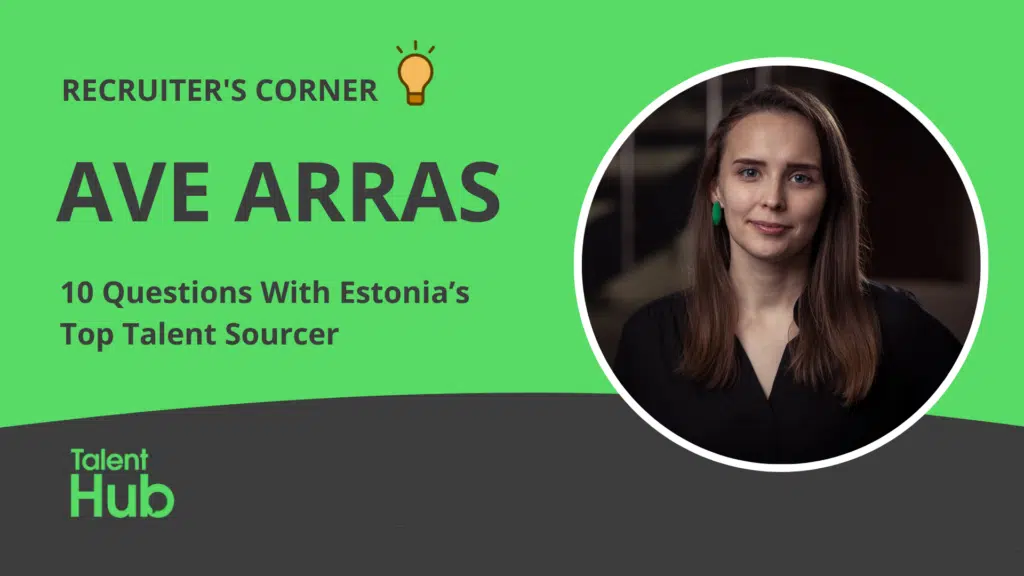Our new content series, called the Recruiter’s Corner, sees us interviewing some of the best recruiters in Estonia and globally. To kick-off it off, we interviewed Ave Arras, a multiple talent sourcing hackathon winner and lead talent partner at Nortal Estonia.
In this article, we asked Ave, a multiple talent sourcing hackathon winner, about some of her best sourcing tips and tricks, her favourite recruitment tools, her next steps as a recruiter and more.
Let’s jump right into it!
Why did you choose recruitment?
Honestly, I can’t say I chose recruitment – it all happened by chance. During my first office job, I was lucky to have a boss who saw potential in me, especially when it came to recruitment. She gave me the chance to start doing some easier recruitment projects and supported my first steps as a junior recruiter. There wasn’t anything technical about it, but that was the time when I got the first taste of recruitment.
From there, the next step was to start coordinating IT recruitments. It became clear quite quickly to me that these people are not applying themselves. After doing some research, I discovered the world of sourcing, so I began learning how to use Google X-Ray, Boolean search etc.
After my first successful projects, I made a conscious decision to start building my career in recruitment. Lucky for me, Nortal was looking for Junior IT Recruiters to join their team. I sent in my application just before the deadline expired. A couple of days went by, I got a call for an interview and the rest is history. I’ve been working at Nortal for over four years now.
I would say recruitment is a good fit for me because I’ve always been a techie. Recruitment offers so many opportunities to learn about programming and automation activities. You can be as technical and data-driven as you want in recruitment, and that’s what drew me into it.
You have won many sourcing competitions, what is it that you like about sourcing?
I’d say the opportunities and the variety it offers you. On one hand, you can do sourcing in a very basic way by relying on one source, for instance, the LinkedIn Search function. Yet, there’s always new tools and innovations coming up that inspire me. You can always come up with new sourcing techniques yourself, so it truly is what you make of it.
And also… I like stalking people, in a legal manner of course! But in all honesty, I guess you can say that I like information.
How do you win a sourcing hackathon?
My number one tip would be to be curious and always keep your eyes open. The key to winning those hackathons is to know where to find the most relevant information. For example, you might come across a task where you’d have to find data scientists. If you don’t know that the main channel for finding data scientists is Kaggle, you are going to struggle.
But one thing is knowing these tools, another is knowing how to use them in a competition setting. Just glancing over the most recent sourcing tools won’t do much for you – you have to actually try them out. Maybe you can even add some of them in your regular sourcing toolbox.
Another thing is using the free information that is given to you by the community. There are many blogs, Facebook groups and Slack channels where there is so much useful content that will help you become a better sourcer and overall recruiter.
And finally, don’t get rusty. You have to keep your skills sharp, and one way to do that is on a website called Sourcing.Games – it’s a place where you can play sourcing games and practice your knowledge.
What is your best sourcing hack?
Keep it simple. Where I see most sourcers struggle is they try to create the fanciest Boolean or X-Ray there has ever existed. All that will do is narrow your results down, which in the long run won’t help you. Instead, what I’ve done over the last years is use only a couple of keywords when I’m searching for a specific role. From there, if needed, I’ll dig in a bit deeper.
My favourite sourcing tool is actually one that can’t be purchased anywhere. It’s a piece of JavaScript code that is used to save you a couple of clicks while you’re sourcing. There’s a specific code for each channel, from LinkedIn, Facebook to GitHub and Xing. You can bookmark this code on your Chrome and use it to take you straight to a candidate’s profile as you source. It’s also something that helps you during the competitions where being as efficient as possible is crucial. It may only save you a couple of seconds per profile, but if you add that up to a week, month or even a year, it ends up being quite significant.
You can find the code as well as the instructions on how to install it HERE.
What is your favourite recruitment tool? Why?
In addition to the JavaScript code, my favourite recruitment tools are ad blockers. I don’t want Google and Facebook to track me everywhere I go, even though I know they do it anyway.
But jokes aside, I try to go outside of Google as much as possible. I like to use other search engines such as Bing and Yandex, mainly because the results there are different from Google’s. One of the downsides to Google is that it shows you the results that it thinks you want to see, not what you are actually looking for.
Do you have any funny recruitment/sourcing stories to tell?
There was a time when I stumbled upon a candidate on Pokémon GO. At the time, I knew a couple of senior IT people who used their real name as their Pokémon username (which is surprising to me). And Pokémon GO has these things called raids, during which you have to visit different places with other players, and together, beat the Pokémon. In one of these raids at Ülemiste City (which is filled with IT companies), I saw a guy who looked very familiar. And after the raid, much to my surprise, I looked up the guy on LinkedIn and it was the same candidate who we wanted to reach out to regarding a role.
So, with this background knowledge of him using Pokémon GO, we were able to reach out to him saying “Hey, we just finished a raid together, but would you also be interested in this role?”
Funnily enough, he replied. My main thing with reaching out to candidates is doing it as personalized as possible. It ended up being a great way for us to stand out from the generic reachout messages.
But although it worked for us, I must advise you to be careful with these kinds of approaches because if done wrong, it can come off as creepy.
What makes a good candidate experience?
Being human. It’s the number one thing that I see recruiters and companies forget. Of course, I rely on templates and guidelines that I have made for myself, but we have to remember that on the other side of the table, email – whatever the case may be – there’s a human being with their hopes, dreams and aspirations. So, once a candidate has entered your recruitment process via a screen or interview, make sure you give them feedback. Take the time to tell them how they can improve their CV or how they can be better at their next interview.
And when it comes to candidate feedback, make sure you do it over the phone. This gives them the opportunity to ask questions. For instance, I’ve had a candidate ask me for tips on how he could find his next job role. I took the time, about half an hour, to consult him. Then, a couple of months go by and he calls me out of the blue to say that he is starting a new role and that my tips helped him along the way. It is especially important to create these connections when you are recruiting in a tiny market such as Estonia.
Remember, people want to be treated as human beings, not candidates.
What are the next recruitment trends?
I think recruitment is becoming more data-driven. Globally, the bigger companies have been doing it for years, but now more so than ever, I see local agencies and in-house talent acquisition teams add more metrics and KPIs to their approach.
One of the easiest recruitment metrics you can start tracking right away is candidate response rate. This is extremely valuable if you are doing full-cycle recruitment. If your response rate is too low, it is easy to hide behind excuses such as the market is too hot, but actually, you need to dig deeper and see how you can improve your message. With this metric, I recommend A/B testing different messages, which will give you great data points to analyze.
Another trend that I see is scraping and automation. Irina Sharmaeva recently wrote a good article about it. She mentioned that as companies increasingly look for talent globally, it makes sense to do more scraping and automation. This is, of course, without losing the human aspect of recruiting.
Where do you learn about recruitment? (Any recommendations)
I’m active in many Facebook recruitment groups (a list of the groups can be found here). People share a lot of useful content and tools there. Sometimes, you can also take part in beta testing new recruitment tools so you can be ahead of the game once those tools go live. I advise you to be active in those groups because when people see that you are curious and want to learn, they are also more likely to share their knowledge with you.
Before the pandemic, I also loved connecting with local and global recruiters by going to conferences and events. I’ve made some amazing connections that way.
Oh, and Hung Lee’s recruiting brainfood is a newsletter I recommend subscribing to.
What are your next steps as a recruiter?
I’m trying to become better at sharing my knowledge. For a long time, I was in the mindset of “no one will find what I have to say interesting.” But with more experience I see that’s not the case. Every one of us has something useful to share and I hope I can set a better example of knowledge sharing in the future.
Another thing I want to improve is my public speaking skills. This is something that is uncomfortable for me, mainly because I’m an overthinker and a procrastinator. But lately, I’ve been accepting more invitations to speak and present. I’ve done a couple of presentations so far and each time I’ve learned something new.
But as a very curious person in general, there are many things I can improve upon. I was once asked a question at an interview about which superpower I would like to have and my answer was to know everything in the universe. That is the kind of philosophy I live by.
By Siim Pettai, Digital Marketing Specialist at TalentHub.



